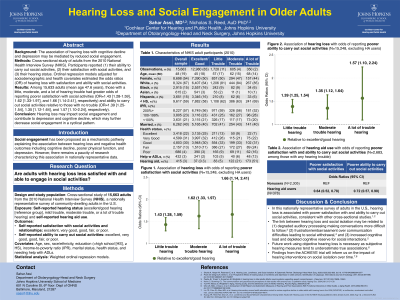Otology/Neurotology
(225) Hearing Loss and Social Engagement in Older Adults
Monday, October 2, 2023
2:45 PM - 3:45 PM East Coast USA Time

Has Audio

Sahar H. Assi, MD
Postdoctoral Research Fellow
Johns Hopkins University
Baltimore, Maryland, United States- NR
Nicholas S. Reed, AuD
Assistant Professor
Johns Hopkins University
Baltimore, Maryland, USA
Presenting Author(s)
Senior Author(s)
Disclosure(s):
Sahar H. Assi, MD: No relevant relationships to disclose.
Introduction: Studies have linked hearing loss with cognitive decline and depression and propose hearing loss’ influence on social engagement as a mediating pathway.
Methods: In the 2010 cycle of the NHIS, a nationally representative survey of noninstitutionalized US residents, participants rated their ability to carry out social activities and their satisfaction with social activities (excellent, very good, good, fair, poor). Self-report hearing without hearing aids was collected and categorized into three groups for analysis purposes: no trouble (excellent and good hearing), mild trouble (a little trouble), and moderate+ trouble (moderate and a lot of trouble hearing). Ordinal regression models were used to estimate odds ratios (OR) of hearing and self-reported ability and satisfaction with social activities. We adjusted for age, sex, race, marital status, income to poverty ratio, health status, and requiring help for activities of daily living.
Results: Among 20,879 US adults (mean age 64.3 years), ordinal regression suggested those with mild and moderate+ hearing trouble had greater odds of reporting lower ability to do social activities relative to those with no trouble (OR=1.80, 95%CI 1.70-1.91, OR=1.92, 95%CI 1.77-2.09, respectively). Likewise, persons with mild and moderate or greater hearing trouble had greater odds of poorer satisfaction with their social activities relative to those with no trouble (OR=1.79, 95%CI 1.69-1.89, OR=2.02, 95%CI 1.86-2.19, respectively).
Conclusions: Hearing loss may impact social engagement and contribute to depression and cognitive decline, which may further decrease social engagement in a cyclical pattern. Efforts to implement hearing interventions may prevent or halt the decline in social engagement and resulting outcomes.
